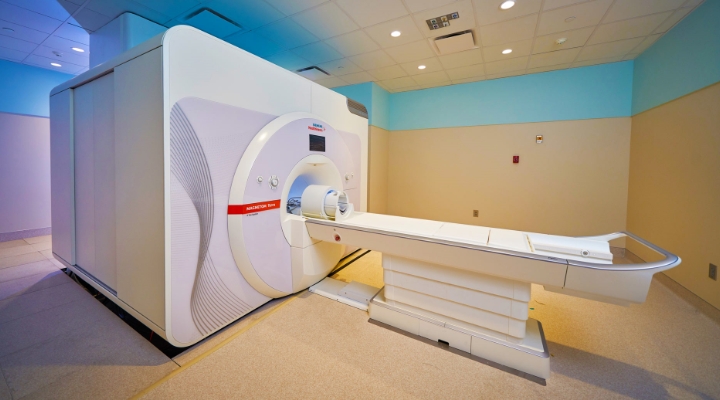Science in Service
of
Medicine
President's Letter
Metrics 2019
Cycle of a Cure
Discovery to Clinic


Introduction

Precision Medicine


Introduction

Tracing Tau to Tackle Alzheimer's Disease

Translational Imaging Center Revamps for Revolutionary 7T MRI

Hope for Slowing ALS

The Heart of Progress: Innovative Valves Create a Legacy for the Future

Test-Driving Carbon Fiber Materials in Space

Lab-on-a-chip Shines Light on Bystander Effect

Creating an Antibody to Fight Silent Killers

A New View of Strep

Translational Luminaries
result



President’s letter
2019 Metrics
Cycle of a Cure
Visionary Gifts

Discovery to Clinic

Innovative Education

Translational Luminaries
Introduction
Building Blocks for Bone Regenration
RNA Therapeutics
Mobile App for Healthy Habits for Breast Cancer Survivors
Designing a Flexible Approach to Breast Reconstruction
Introduction
Tracing Tau to Tackle Alzheimer's Disease
Translational Imaging Center Revamps for Revolutionary 7T MRI
Hope for Slowing ALS
The Heart of Progress: Innovative Valves Create a Legacy for the Future
Test-Driving Carbon Fiber Materials in Space
Lab-on-a-chip Shines Light on Bystander Effect
Creating an Antibody to Fight Silent Killers
A New View of Strep
result

Mobile App Drives Healthy Habits for Breast Cancer Survivors
Study participants achieved goals with real-time access to clinicians

One of the biggest hurdles for a survivor is finding the support needed to maintain a healthy lifestyle: Although clinicians tell patients that losing weight reduces the risk of cancer recurrence, they typically don’t provide structured tools to achieve this weight loss. This mobile application provides a link to the physician’s office so that real-time changes can be made.
—
Tejal Patel
, MDAssistant Professor of Clinical Medicine in Oncology Houston Methodist
The link between being overweight and cancer is becoming increasingly clear. A recent meta-analysis of 82 studies, including more than 213,000 women, indicated that reducing obesity also reduces the risk of cancer recurrence, as well as the frequency of hospital readmission.
To help breast cancer survivors make healthier lifestyle choices, breast medical oncologist Tejal Patel, MD, clinical dietitian Renee Stubbins, PhD, and bioinformatics expert Stephen Wong, PhD, worked together to develop and test a mobile app that helped survivors interact with their health care team, including a clinical dietitian, especially between appointments. The results proved promising: Those who used the Methodist Hospital Cancer Health Application (MOCHA) consistently lost weight—mainly due to daily, real-time interactions with their health care team via the mobile app.

Tejal Patel
, MD
Renee Stubbins
, PhD, RDThe pilot study revealed that 56 percent of its enrolled patients lost an average of 3.5 pounds while using MOCHA over a four-week period. It also showed that the more the participants used the app, the more likely they were to lose weight. These results were published in the November 2018 issue of
JCO Clinical Cancer Informatics
.
Stephen T.C. Wong
, PhDStubbins R, He T, Yu X, Puppala M, Ezeana C, Chen S, Alvarado M, Ensor J, Rodriguez A, Niravath P, Chang JC, Patel T, Wong STC. A Behavior-Modification, Clinical-Grade Mobile Application to Improve Breast Cancer Survivors’ Accountability and Health Outcomes. JCO Clinical Cancer Informatics: Nov 30, 2018.
This research was supported in part by the Ting Tsung and Wei Fong Chao Foundation and the John S. Dunn Research Foundation.
What sets MOCHA apart from consumer health apps is that Houston Methodist incorporated a clinical dietitian who actively communicated with patients to provide direct feedback and guidance, reviewing entries and making comments and suggestions in real time. For Houston Methodist dietitian Renee Stubbins, PhD, the app allowed her to interact with more patients on a daily basis, something she believes can be adapted by other registered dietitians and health care providers. She also helped motivate participants to support each other via the app.
“Maintaining a healthy weight is difficult enough for the average person, let alone for those who’ve survived breast cancer,” said Stubbins. “So being able to empower and support these women in real time made a difference.”
MOCHA was created by Stephen T. C. Wong, PhD, John S. Dunn, Sr. Presidential Distinguished Chair in Biomedical Engineering, and his informatics development team as a way for Houston Methodist health care providers to offer continued care beyond hospital walls. While the app is currently accessible to study participants, the goal is to broaden its use in multi-center studies and focus on changing long-term behaviors to reduce health issues most common in cancer survivors.
More from Discovery to Clinic
Contact Us
© 2021. Houston Methodist, Houston, TX. All rights reserved.
Privacy & Disclaimer
.











